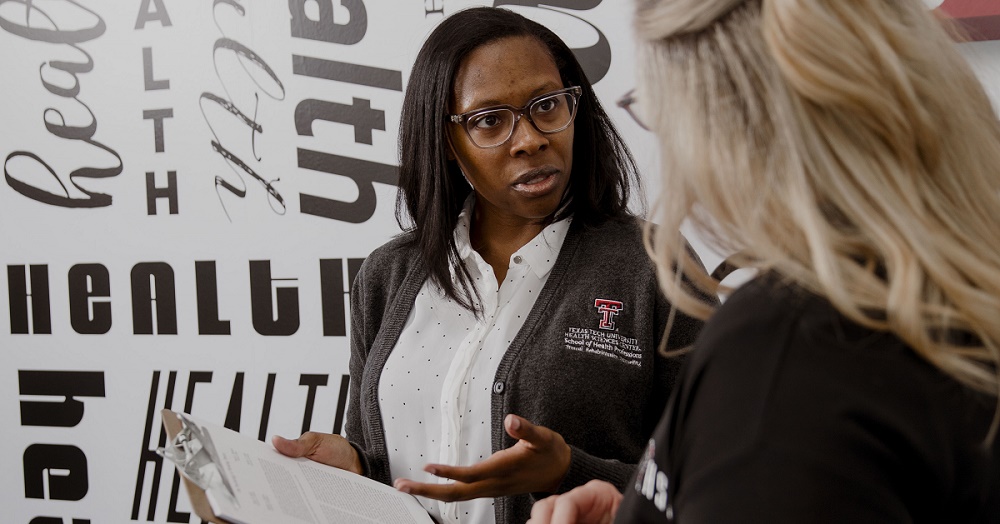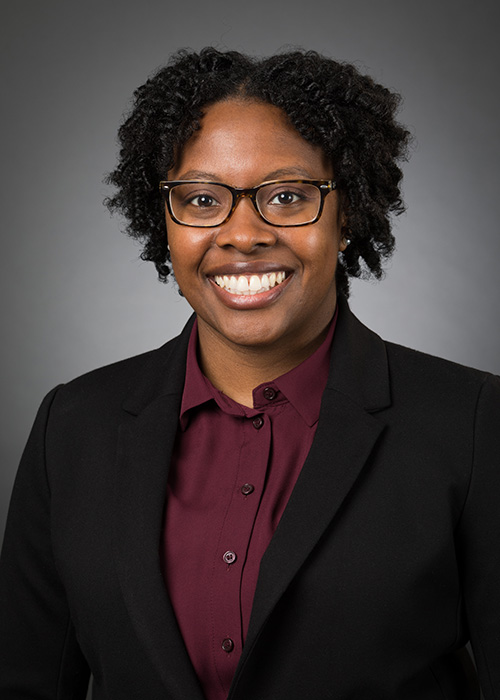Raising Awareness for Persons with Disabilities
The TTUHSC Department of Clinical Counseling and Mental Health trains students to empower, advocate for, and provide skills for individuals with disabilities to have their needs met.

Disability awareness helps decrease ongoing stigmas
Living with a disability has many effects on a person’s life, both positive and negative. Overcoming obstacles, achieving goals or dreams, and living a fulfilling life are all things that anyone can relate to.
The United States Census Bureau says that 12.7 percent or about 40.8 million people in the United States live with a disability. Disability awareness helps decrease ongoing stigmas surrounding persons with disabilities to create a positive, inclusive society for everyone.
We spoke with Taryn Richardson, Ph.D., NCC, CRC, about the challenges that persons with disabilities face, how they would like to be treated, and how to be supportive on their journey for inclusion. Richardson is an Assistant Professor in the Department of Clinical Counseling and Mental Health of the TTUHSC School of Health Professions.
Persons With Disabilities In the Workplace
People living with a disability may feel the need to not disclose their condition, especially if they don’t require specific accommodations to carry out their job. No one wants to be treated “less than” or differently from their peers.
Richardson explains that society’s views around disability (positive or negative) can add to long-established stigmas.
“If they’re not seeking an accommodation(s), they don’t need to disclose,” she explains. “That’s their right to privacy.”
It’s also important to remember that there are many people living with health issues that are not discernible to the naked eye.
“One in four people are walking around with a chronic condition, illness or disability,” Richardson says.
Dignity, Respect, Inclusion

Taryn Richardson, Ph.D.
“Persons with disabilities want to be treated no differently than anyone else,” Richardson says. “This [disability] is an aspect of their identity and not a complete version of who they are.”
Richardson explains that any group of people who have been marginalized or oppressed in any way tend to be devalued by society. The same is true for people living with disabilities. “Historically, we know the way persons with disabilities have been treated is largely due to societal attitudes,” she explains.
As a society, we tend to value health, independence and our outward appearance. A disability can impact one or all three of these needs, as people with visible physical disabilities have long been ostracized and overlooked.
Richardson wants to see more inclusion for people living with disabilities, stressing that the statistics show the majority of the population has a personal connection.
“We have experience with disability or a chronic condition ourselves,” she says. “Our family and friends, we’re not far removed from it.”
Inclusion can take many forms. In an educational setting, it could mean adapting how the material is presented. Including sign language interpreters or closed captions for an event could increase inclusivity and awareness.
Richardson stresses the importance of “person-first language” when describing persons with disabilities. Simply put, this means that one should focus on the person rather than the disability.
How to Treat Persons with Disabilities
While Richardson says she isn’t personally impacted by a disability, her friends and family remain a driving motivation for her work.
“I see how a disability or a chronic condition can affect individuals and family units,” she explains. “What’s rewarding for me is that I’m able to be in a position to empower, advocate for, and provide skills for individuals with disabilities to have their needs met.
“You have to be passionate about this line of work,” she continues. “It’s not a career field that you can take lightly.”
“It’s a field that requires a sense of empathy and understanding of what others are going through”, she says.
“We work with individuals at a time when they might be very vulnerable,” Richardson says. “Getting a diagnosis is a lot to process. We join them on their journey to support them and help them adjust and adapt. This also involves their family unit.”
The reward comes in joining them on their journey and helping them achieve the quality of life they seek.
“It’s rewarding to watch the journey, seeing them feel like they’ve adjusted or adapted,” she continues. “They haven’t given up hope, life can continue despite what they’re currently facing.”
Raising Awareness of Persons with Disabilities
There are many resources available for how to become involved and raise awareness for persons with disabilities.
“I encourage people to seek out those opportunities to bring awareness to their communities and workplaces,” Richardson says.
Related Stories
The John Wayne Cancer Foundation Surgical Oncology Fellowship Program at Texas Tech University Health Sciences Center Announced
TTUHSC is collaborating with the John Wayne Cancer Foundation and has established the Big Cure Endowment, which supports the university’s efforts to reduce cancer incidence and increase survivability of people in rural and underserved areas.
Making Mental Health a Priority in the New Year
Sarah Mallard Wakefield, M.D., a psychiatrist with Texas Tech Physicians, talks about strategies to combat widespread and growing anxiety.
TTUHSC Dean to be Inducted into the National Academies of Practice as Distinguished Fellow
Gerard E. Carrino, Ph.D., MPH, dean of the TTUHSC Julia Jones Matthews School of Population and Public Health, will be inducted into the National Academies of Practice (NAP) as a Distinguished Fellow of the Public Health Academy.
Recent Stories
The John Wayne Cancer Foundation Surgical Oncology Fellowship Program at Texas Tech University Health Sciences Center Announced
TTUHSC is collaborating with the John Wayne Cancer Foundation and has established the Big Cure Endowment, which supports the university’s efforts to reduce cancer incidence and increase survivability of people in rural and underserved areas.
TTUHSC Receives $1 Million Gift from Amarillo National Bank to Expand and Enhance Pediatric Care in the Panhandle
TTUHSC School of Medicine leaders accepted a $1 million philanthropic gift from Amarillo National Bank on Tuesday (Feb. 10), marking a transformational investment in pediatric care for the Texas Panhandle.
Texas Tech University Health Sciences Center Permian Basin Announces Pediatric Residency Program Gift
TTUHSC Permian Basin, along with the Permian Strategic Partnership and the Scharbauer Foundation, Feb. 5 announced a gift that will fund a new pediatric residency.
